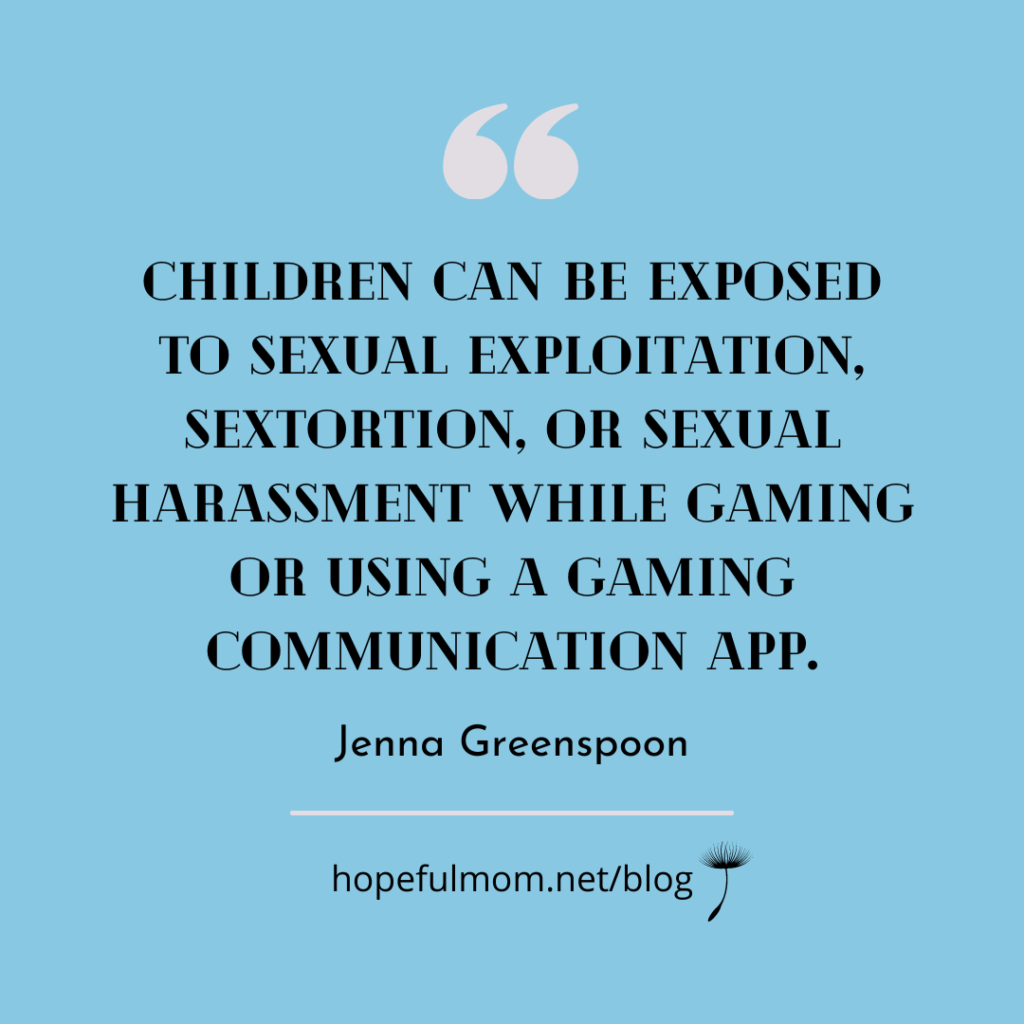Jenna Greenspoon of Kidas is here this month to talk with us about keeping our kids safe while they are gaming online. Since January is Human Trafficking Awareness month, it’s the perfect time to explore the dangers of sexual exploitation and harassment while gaming.
Children spend hours and hours online daily for both educational and non-educational purposes. You have likely seen this in your own home or read about it. Many parents worry about what their children are exposed to during their time online engaging in a hobby, such as gaming, and how they can prevent sexual exploitation and harassment from happening. They want to protect their children.
When it comes to sexual content, let’s look at what your children may be exposed to online and how you can work with your child to keep them safe from inappropriate sexual content.
Inappropriate Sexual Language
Many teens are exposed to and use sexual language while playing online video games. The way teens talk to one another can be vulgar and aggressive at times and also very inappropriate. Inappropriate sexual language could be calling someone a slut, for example. Sexually inappropriate language also includes making sexual “jokes” about someone. Your child may be directly or indirectly exposed to inappropriate sexual language while gaming in voice or text chats or through communication apps such as Discord while playing video games.
Profanity with Sexual Anatomy
Many teens use sexual insults towards one another. These would be comments that involve calling someone a crude nickname of male or female genitalia in order to put them down.
Description of Sexual Acts
Many gamers describe sexual acts using vulgar and obscene language to demean others in the game.
Exposure To Sexual Images or Videos
In both public and private chats in gaming and on gaming communication apps, your child may be exposed to sexual images or videos. They may be sent links or images by other users. Additionally, parents have reported exposure to sexual content through ads on video games.
Sexual Harassment and Sextortion
With cyberbullying on the rise, children and teens may be exposed to sexual harassment and even sextortion, a form of sexual exploitation, online. Sexual harassment includes unwanted sexual comments, comments that make someone feel uncomfortable and/or dirty, and comments that make someone feel powerless. Sextortion is when a child is threatened or coerced into sending sexually explicit photos or videos to someone else online. The intent of the person coercing the child is to further exploit them and blackmail them.
The Video Games
In addition to the communication that takes place in video games, many games themselves include sexually inappropriate content or sexual exploitation. These games typically have mild warnings stating the game is not appropriate for gamers of all ages. It is pretty simple for an avid gamer to lie about their age in order to bypass the warnings and play the game.

What Can You Do to Keep Your Child Safe?
There is no question that there are many risks when it comes to children and teens online. It’s a whole other world that parents need to worry about their children in. These tips will help you keep your child safe and protected online.
- It may sound simple enough, but talk to your child. Many parents have a hard time talking to their children about online safety, especially when it comes to sexual content. However, it is extremely important that children understand the repercussions of sharing images or videos of themselves online, especially with people they do not know. Share stories from the news with your children so they understand these situations happen and that it is extremely important to remain aware of the dangers and how to be safe online.
- Remind your child not to accept or open images or download links with unknown content from people they do not know. While opening a link or downloading a file can be dangerous for their computer and privacy, it is also possible they may open explicit images or videos.
- Tell them to never go into a chat or change apps to connect with someone they met privately online. In many cases, this is where sextortion or sexual exploitation takes place. Once a child is lured by an online predator into a private chat or app, the predator uses it as an opportunity to sexually harass and blackmail that child.
- Use a protective software on your child’s computer to keep your child safe while remaining in the know about your child’s gaming behavior. Try a software like ProtectMe which alerts parents of any dangers their child comes in contact with while gaming. ProtectMe sends a report with threats detected as well as recommendations on how to deal with the threat with your child. Use the ProtectMe report to identify which games your child is playing and ensure they are age appropriate.
- Report any harassment or inappropriate sexual content. Block any player that makes your child feel uncomfortable in any way. Keep a record of the inappropriate content to use for the report.
Keeping your child safe online is a big job. Keeping them safe from sexual content or sexual exploitation online can feel scary and overwhelming. With open communication, support from websites like this one and software like ProtectMe, you can keep your child protected from dangers online.
We at Hopeful Mom appreciate your support and readership. We love helping others learn how to educate and communicate with their children, so please share this post with your friends. Subscribe below to receive updates from Hopeful Mom, as well as information on Barb’s upcoming book. And be sure to connect on Facebook, Instagram, and LinkedIn.
About the author

Jenna Greenspoon
Jenna Greenspoon is the Head of Parenting atKidas, a technology company focused on developing anti-cyberbullying and predator protection software for PC games.


